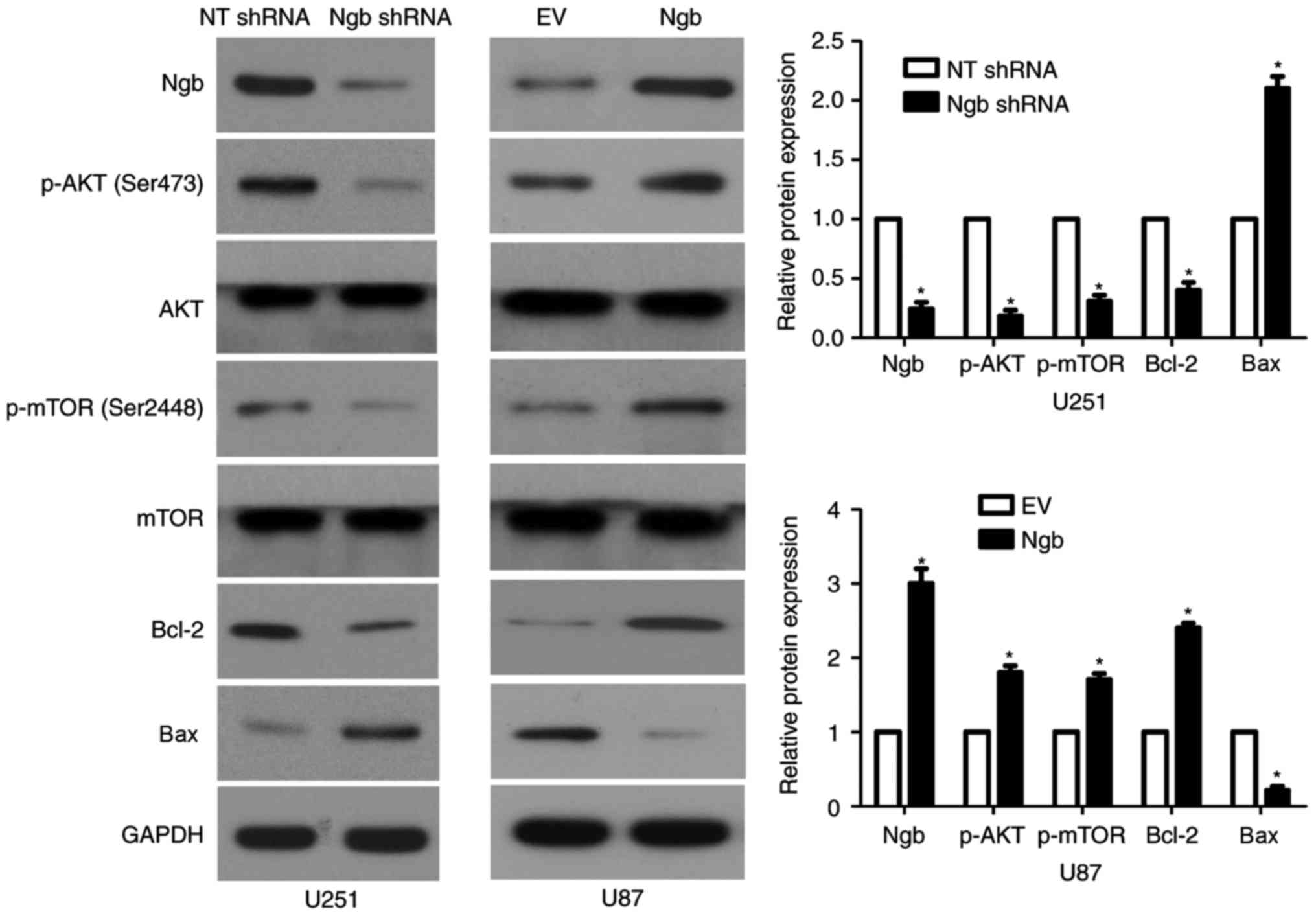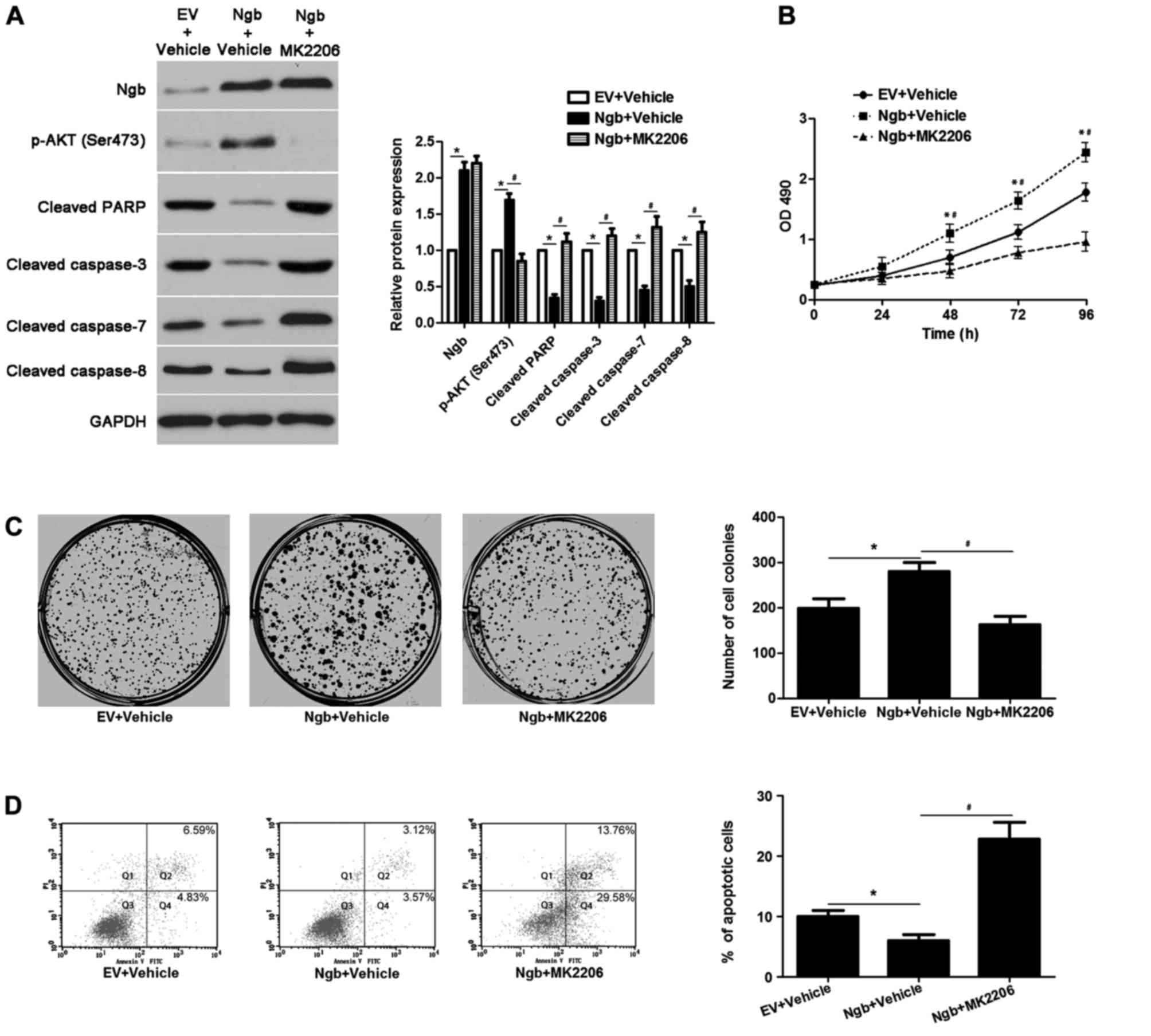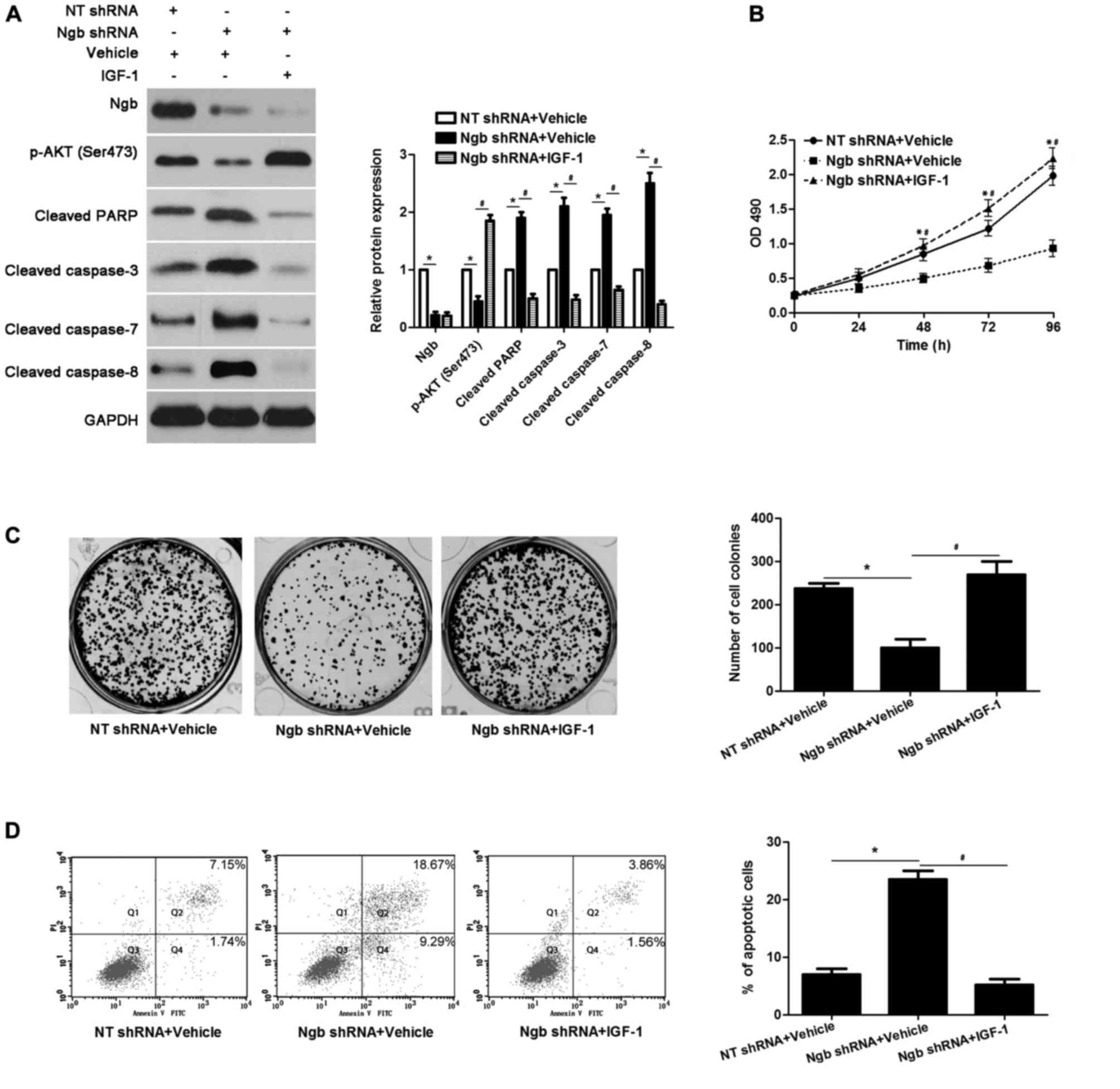|
1
|
Awad AJ, Burns TC, Zhang Y and Abounader
R: Targeting MET for glioma therapy. Neurosurg Focus. 37:E102014.
View Article : Google Scholar : PubMed/NCBI
|
|
2
|
Huse JT and Aldape KD: The evolving role
of molecular markers in the diagnosis and management of diffuse
glioma. Clin Cancer Res. 20:5601–5611. 2014. View Article : Google Scholar : PubMed/NCBI
|
|
3
|
Chistiakov DA and Chekhonin VP:
Extracellular vesicles shed by glioma cells: Pathogenic role and
clinical value. Tumour Biol. 35:8425–8438. 2014. View Article : Google Scholar : PubMed/NCBI
|
|
4
|
Fordel E, Thijs L, Martinet W, Lenjou M,
Laufs T, Van Bockstaele D, Moens L and Dewilde S: Neuroglobin and
cytoglobin overexpression protects human SH-SY5Y neuroblastoma
cells against oxidative stress-induced cell death. Neurosci Lett.
410:146–151. 2006. View Article : Google Scholar : PubMed/NCBI
|
|
5
|
Fordel E, Thijs L, Martinet W, Schrijvers
D, Moens L and Dewilde S: Anoxia or oxygen and glucose deprivation
in SH-SY5Y cells: A step closer to the unraveling of neuroglobin
and cytoglobin functions. Gene. 398:114–122. 2007. View Article : Google Scholar : PubMed/NCBI
|
|
6
|
Peroni D, Negro A, Bähr M and Dietz GP:
Intracellular delivery of Neuroglobin using HIV-1 TAT protein
transduction domain fails to protect against oxygen and glucose
deprivation. Neurosci Lett. 421:110–114. 2007. View Article : Google Scholar : PubMed/NCBI
|
|
7
|
Emara M, Salloum N and Allalunis-Turner J:
Expression and hypoxic up-regulation of neuroglobin in human
glioblastoma cells. Mol Oncol. 3:45–53. 2009. View Article : Google Scholar : PubMed/NCBI
|
|
8
|
Emara M, Turner AR and Allalunis-Turner J:
Hypoxic regulation of cytoglobin and neuroglobin expression in
human normal and tumor tissues. Cancer Cell Int. 10:332010.
View Article : Google Scholar : PubMed/NCBI
|
|
9
|
Oleksiewicz U, Daskoulidou N, Liloglou T,
Tasopoulou K, Bryan J, Gosney JR, Field JK and Xinarianos G:
Neuroglobin and myoglobin in non-small cell lung cancer:
Expression, regulation and prognosis. Lung Cancer. 74:411–418.
2011. View Article : Google Scholar : PubMed/NCBI
|
|
10
|
Fiocchetti M, Nuzzo MT, Totta P, Acconcia
F, Ascenzi P and Marino M: Neuroglobin, a pro-survival player in
estrogen receptor α-positive cancer cells. Cell Death Dis.
5:e14492014. View Article : Google Scholar : PubMed/NCBI
|
|
11
|
Fiocchetti M, Cipolletti M, Leone S,
Naldini A, Carraro F, Giordano D, Verde C, Ascenzi P and Marino M:
Neuroglobin in breast cancer cells: Effect of hypoxia and oxidative
stress on protein level, localization, and anti-apoptotic function.
PLoS One. 11:e01549592016. View Article : Google Scholar : PubMed/NCBI
|
|
12
|
Fiocchetti M, Cipolletti M, Leone S,
Ascenzi P and Marino M: Neuroglobin overexpression induced by the
17β-Estradiol-Estrogen receptor-α pathway reduces the sensitivity
of MCF-7 breast cancer cell to paclitaxel. IUBMB Life. 68:645–651.
2016. View
Article : Google Scholar : PubMed/NCBI
|
|
13
|
Fiocchetti M, Camilli G, Acconcia F, Leone
S, Ascenzi P and Marino M: ERβ-dependent neuroglobin up-regulation
impairs 17β-estradiol-induced apoptosis in DLD-1 colon cancer cells
upon oxidative stress injury. J Steroid Biochem Mol Biol.
149:128–137. 2015. View Article : Google Scholar : PubMed/NCBI
|
|
14
|
Zhang J, Lan SJ, Liu QR, Liu JM and Chen
XQ: Neuroglobin, a novel intracellular hexa-coordinated globin,
functions as a tumor suppressor in hepatocellular carcinoma via
Raf/MAPK/Erk. Mol Pharmacol. 83:1109–1119. 2013. View Article : Google Scholar : PubMed/NCBI
|
|
15
|
Zhang B, Chang M, Wang J and Liu Y:
Neuroglobin functions as a prognostic marker and promotes the tumor
growth of glioma via suppressing apoptosis. Biomed Pharmacother.
88:173–180. 2017. View Article : Google Scholar : PubMed/NCBI
|
|
16
|
Tu K, Li J, Verma VK, Liu C, Billadeau DD,
Lamprecht G, Xiang X, Guo L, Dhanasekaran R, Roberts LR, et al:
Vasodilator-stimulated phosphoprotein promotes activation of
hepatic stellate cells by regulating Rab11-dependent plasma
membrane targeting of transforming growth factor beta receptors.
Hepatology. 61:361–374. 2015. View Article : Google Scholar : PubMed/NCBI
|
|
17
|
Riviere I, Brose K and Mulligan RC:
Effects of retroviral vector design on expression of human
adenosine deaminase in murine bone marrow transplant recipients
engrafted with genetically modified cells. Proc Natl Acad Sci USA.
92:pp. 6733–6737. 1995; View Article : Google Scholar : PubMed/NCBI
|
|
18
|
Colicelli J and Goff SP: Isolation of a
recombinant murine leukemia virus utilizing a new primer tRNA. J
Virol. 57:37–45. 1986.PubMed/NCBI
|
|
19
|
Sun L, Hui AM, Su Q, Vortmeyer A,
Kotliarov Y, Pastorino S, Passaniti A, Menon J, Walling J, Bailey
R, et al: Neuronal and glioma-derived stem cell factor induces
angiogenesis within the brain. Cancer Cell. 9:287–300. 2006.
View Article : Google Scholar : PubMed/NCBI
|
|
20
|
Liu M and Wang J, Qi Q, Huang B, Chen A,
Li X and Wang J: Nitidine chloride inhibits the malignant behavior
of human glioblastoma cells by targeting the PI3K/AKT/mTOR
signaling pathway. Oncol Rep. 36:2160–2168. 2016. View Article : Google Scholar : PubMed/NCBI
|
|
21
|
Yang J, Yang Q, Yu J, Li X, Yu S and Zhang
X: SPOCK1 promotes the proliferation, migration and invasion of
glioma cells through PI3K/AKT and Wnt/β-catenin signaling pathways.
Oncol Rep. 35:3566–3576. 2016. View Article : Google Scholar : PubMed/NCBI
|
|
22
|
Yu JS and Cui W: Proliferation, survival
and metabolism: The role of PI3K/AKT/mTOR signalling in
pluripotency and cell fate determination. Development.
143:3050–3060. 2016. View Article : Google Scholar : PubMed/NCBI
|
|
23
|
Luo M, Liu Q, He M, Yu Z, Pi R, Li M, Yang
X, Wang S and Liu A: Gartanin induces cell cycle arrest and
autophagy and suppresses migration involving PI3K/Akt/mTOR and MAPK
signalling pathway in human glioma cells. J Cell Mol Med. 21:46–57.
2017. View Article : Google Scholar : PubMed/NCBI
|
|
24
|
Zanotto-Filho A, Braganhol E, Battastini
AM and Moreira JC: Proteasome inhibitor MG132 induces selective
apoptosis in glioblastoma cells through inhibition of PI3K/Akt and
NFkappaB pathways, mitochondrial dysfunction, and activation of
p38-JNK1/2 signaling. Invest New Drugs. 30:2252–2262. 2012.
View Article : Google Scholar : PubMed/NCBI
|
|
25
|
Yu Z, Xie G, Zhou G, Cheng Y, Zhang G, Yao
G, Chen Y, Li Y and Zhao G: NVP-BEZ235, a novel dual PI3K-mTOR
inhibitor displays anti-glioma activity and reduces chemoresistance
to temozolomide in human glioma cells. Cancer Lett. 367:58–68.
2015. View Article : Google Scholar : PubMed/NCBI
|
|
26
|
Ding L, Ding L, Wang S, Wang S, Wang W,
Wang W, Lv P, Lv P, Zhao D, Zhao D, et al: Tanshinone IIA affects
autophagy and apoptosis of glioma cells by inhibiting
phosphatidylinositol 3-kinase/Akt/mammalian target of rapamycin
signaling pathway. Pharmacology. 99:188–195. 2017. View Article : Google Scholar : PubMed/NCBI
|
|
27
|
Zhao N, Guo Y, Zhang M, Lin L and Zheng Z:
Akt-mTOR signaling is involved in Notch-1-mediated glioma cell
survival and proliferation. Oncol Rep. 23:1443–1447.
2010.PubMed/NCBI
|
|
28
|
Koul N, Sharma V, Dixit D, Ghosh S and Sen
E: Bicyclic triterpenoid Iripallidal induces apoptosis and inhibits
Akt/mTOR pathway in glioma cells. BMC Cancer. 10:3282010.
View Article : Google Scholar : PubMed/NCBI
|
|
29
|
Wang P, Zhen H, Jiang X, Zhang W, Cheng X,
Guo G, Mao X and Zhang X: Boron neutron capture therapy induces
apoptosis of glioma cells through Bcl-2/Bax. BMC Cancer.
10:6612010. View Article : Google Scholar : PubMed/NCBI
|

















